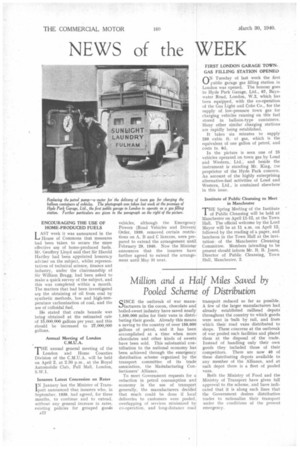Million and a Half Miles Saved by Pooled Scheme of Distribution
Page 24

If you've noticed an error in this article please click here to report it so we can fix it.
SINCE the outbreak of war manufacturers in the cocoa, chocolate and boiled-sweet industry have saved nearly 1,500,000 miles for their vans in distributing their goods. Already this means a saving to the country of over 150,000 gallons of petrol, and it has been accomplished at a time when more chocolates and other kinds of sweets have been sold. This substantial contribution to the national economy has been achieved through the emergency distribution scheme organized by the transport committee of its trade association, the Manufacturing Confectioners' Alliance.
To meet Government requests for a reduction in petrol consumption and economy in the use of transport generally, the manufacturers decided that much could be done if local deliveries to customers were pooled, overlapping of services minimized by co-operation, and long-distance road transport reduced so far as possible. A few of the larger manufacturers had already established railhead depots throughout the country to which goods were sent in bulk by rail, and from which their road vans distributed to shops. These concerns at the outbreak of war pooled such facilities and placed them at the disposal of the trade. Instead of handling only their own goods they included those of their competitors. There are now 40 of these distributing depots available to any member of the Alliance, and at each depot there is a fleet of pooled vans.
Both the Ministry of Food and the Ministry of Transport have given full approval to the scheme, and have indicated that it is along such lines that the Government desires distributive trades to rationalize their transport under the conditions of the present emergency.




























































